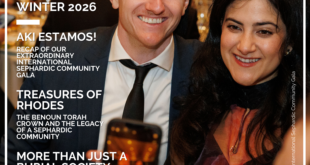The Sephardic Experience quadrilogy, is a priceless sound document in which the Renaissance Players present their own performance versions of well– and lesser–known romansas (ballads), kantigas (religious songs) and muwashshahat (poetical forms) which have survived for centuries entirely via oral/aural transmission by parents, grandparents, friends and acquaintances within the family circle, while working, or as a form of ad hoc entertainment in Sephardic communities of the West and East. Sadly, as the end of the 20th century draws near we are witnessing the alarming disappearance of Spanish–Jewish culture due to vast, worldwide changes in social circumstances. In fact, these songs are no longer a part of the rich, musical fabric of the everyday life of the Sephardim.
The collection of Spanish–Jewish songs in this third volume, Gazelle and Flea, include satire, a panegyric addressed to a minstrel, wedding songs, laments, coplas, kantigas, and romansas. These are placed cheek–by–jowl with traditional dances from the Sephardim’s host countries, Bulgaria, South Yugoslavia and Macedonia. The text covers themes of love from literal and figurative references involving animals, humans and insects (e.g. gazelle and flea) to more direct faces of love—courtships which are frustrated, sadly disappointed and sea/siren connected, and weddings, specifically the traditional marriage preparations with their expectations of nuptial bliss and love’s frightful sufferings in a cycle of destruction–famine–exile. The songs and dances are performed with improvised decoration as the melodies to which these originally Hebrew texts were sung are lost forever in the ancient folk-memory.

the artists
The Renaissance Players is the longest standing professional Early Music ensemble in Australia. Founded in 1967 by Winsome Evans, the ensemble is well–known for its varied and imaginative concert programs which are presented in costume and enlivened by poetry, mime, dance and processions. They perform a wide range of music dating from the 9th century through contemporary folk and classical styles, using replicas of, and/or ethnically, authentic instruments where possible and attempting to reproduce performance styles appropriate to whatever music is played. The Renaissance Players have a library of over 2,500 pieces, which have all been collected, arranged and/or composed by Winsome Evans.
Winsome Evans, Director of the Renaissance Players, is also the producer of this series. Aside from the performance and dance schedule of the Renaissance Players, Winsome teaches music at the University of Sydney and is one of Australia’s busiest harpsichordists. She has mastered an additional 25 wind, string, percussion and keyboard instruments.
Members of The Renaissance Players performing on this recording include Winsome Evans, Benedict Hames, Llew Kiek, Mara Kiek, Melissa Irwin, Mina Kanaridis, Andrew Lambkin, Barbara Stackpool, and poetry reader Geoff Sirmai.
tracklist
Cetvorno oro – BulgariaEl Rey de Francia tres hijas tenia -RhodesRychenitsa – BulgariaPor amar una donzella -SmyrnaAjugar de novia galana – BulgariaStavro povrateno – MacedoniaY una madre comio asado – TetuanEl conde niño – RhodesCetvorka – MacedoniaHija mia mi querida – BalkansY aunque yo no vendi nada – TetuanPlay for me minstrelDesde hoy la mi madre – TetuanPravo za ramo – MacedoniaFleas – Joseph ibn SalhEstavase la morta – AndalusiaDvajspetorka – MacedoniaDuje raske kruske kara manke, Kyustendilka – MacedoniaIntérpretes: The Renaissance Players [Winsome Evans (alto shawm, zurna, supeljka, whistle, harp, psaltery, bowed diwan saz, pandero), Benedict Hames (vielle, gadulka, bowed diwan saz, whistle), Llew Kiek (tambura, diwan zaz, baglama, ud,, bouzouki), Mara Kiek (alto, tapan), Melissa Irwin (soprano, ud, gittern), Mina Kanaridis (soprano), Andrew Lambkin (darabukka, pandero, tabor, kasike), Barbara Stackpool (sistrum, zils), Geoff Sirmai (poetry reader)] – Winsome Evans, dir.


 eSefarad Noticias del Mundo Sefaradi
eSefarad Noticias del Mundo Sefaradi


Hello blog owner. I have a small request. I was just googleing for some information on this topic and found this blog. Some really nice stuff you posted here, can I please share this post on my new website I’m workin on? Pretty please:) I will check back again later to see what you answered. Thanks, Ian Hill .
Ian, is possible if you put our website as a source and link the original article.